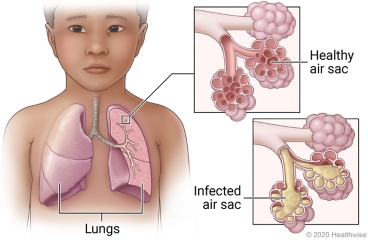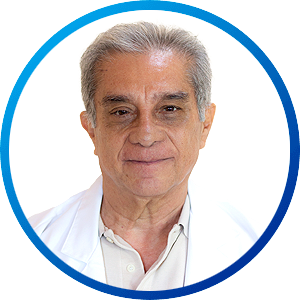How to Spot Pneumonia in Kids: Key Signs and When to Seek Help
Warning Signs of Pneumonia: A Guide for Parents
Pneumonia in kids is one of the leading causes of hospitalization and one of the most serious respiratory conditions that can affect children worldwide. Although symptoms may initially resemble those of a cold or flu, pneumonia affects the lungs and can lead to severe complications if not treated early. This is why it’s crucial to understand the early signs and know when to seek medical interventions. However, if not treated early, pneumonia can cause serious complications that require intensive care hospitalization.
At Hospital CMQ, our pediatric specialists are equipped with the expertise and resources needed to diagnose and treat pneumonia effectively in children. Moreover, they personalize care to assess each case, ensuring that their young patients receive timely, targeted treatment to support a full recovery. Recognizing the symptoms and acting quickly can make all the difference, and our pediatricians are here to provide the guidance and care your child needs every step of the way.
Did you know that?
According to the World Health Organization, pneumonia is responsible for approximately 15% of all deaths in children under five, making it a serious health concern for parents.
What is Pneumonia in Children?
Pneumonia is an infection that inflames the air sacs in the lungs, causing them to fill with fluid or pus. In children, pneumonia can be caused by a range of pathogens, including bacteria, viruses, and fungi, with bacterial and viral infections being the most common. When the lungs become infected, it leads to symptoms such as coughing, fever, chest pain, and difficulty breathing. Additionally, childhood pneumonia can vary in severity, from mild cases that resemble a cold to severe infections requiring hospitalization.
Likewise, pneumonia in kids is especially concerning because children’s immune systems are not fully developed, making it harder for them to fight off infections. Additionally, pneumonia can escalate quickly, leading to complications such as respiratory failure. For this reason, understanding what pneumonia is and how it affects our children is essential to prevent these complications and improve recovery outcomes.
Types of Pneumonia
Pneumonia can be classified into different types based on the cause of the infection, where it was acquired, and how it presents in the lungs. Here are the main types:
- Viral Pneumonia: The most common in young children. It often begins with flu-like symptoms and can lead to infections. Influenza viruses are frequent culprits.
- Bacterial Pneumonia: This form is often more severe and is frequently caused by Streptococcus pneumoniae. Bacterial pneumonia tends to have a sudden onset with high fever, rapid breathing, and chest pain.
- Fungal Pneumonia: Though rare in healthy children, fungal pneumonia can affect those with compromised immune systems, such as children undergoing chemotherapy.
- Aspiration Pneumonia: This type occurs when a child inhales food, liquid, or other substances into the lungs, causing infection.
Understanding these types of pneumonia helps in identifying the cause and determining the most effective treatment, especially in children, whose symptoms can vary widely.
Walking Pneumonia in Kids
Walking pneumonia, or atypical pneumonia, is a milder form of pneumonia often caused by a type of bacteria that affects the respiratory system. Unlike more severe cases of pneumonia, children with walking pneumonia may continue with their daily activities, because symptoms tend to be less intense. Since the symptoms can be mistaken for those of a common cold, walking pneumonia is sometimes overlooked until symptoms persist or worsen. This form of pneumonia is not typically dangerous, however, seeking medical advice is essential to prevent complications.
Meet Our Pediatric Specialists at Hospital CMQ
With extensive training and experience in pediatrics, our doctors are experts in diagnosing and treating a wide range of childhood conditions. Likewise, our specialists ensure that each child receives the highest standard of medical care, with an approach that emphasizes early detection, preventative care, and personalized treatment plans.
Whether addressing acute illnesses or managing long-term conditions, our pediatricians at Hospital CMQ combine state-of-the-art medical expertise with a caring touch, ensuring your child’s health and well-being are in trusted hands. Book your appointment now!
Pediatricians Treating and Diagnosing Pneumonia in Puerto Vallarta
Pneumonia Symptoms in Kids
Pneumonia symptoms in children can vary widely, depending on the child’s age, the type of pneumonia, and its severity. Common signs include persistent cough, fever, and rapid or difficult breathing, which may cause the child to visibly struggle to catch their breath. Likewise, younger children may show more subtle signs, like decreased appetite, fussiness, or lethargy. Moreover, in some cases, kids might experience chest or abdominal pain, especially when coughing. These symptoms can sometimes be mistaken for a cold or the flu, so parents need to watch for any signs of difficulty breathing or sudden worsening of symptoms and seek medical attention.
Severe Signs of Pneumonia in Kids
Severe pneumonia in children is a serious condition that requires immediate medical attention. Children with severe pneumonia may show signs such as rapid breathing accompanied by grunting or wheezing sounds. Also, chest pain, high fever, and a pronounced cough are common signs of severe pneumonia. Recognizing these symptoms early and seeking prompt medical treatment is essential, as severe pneumonia can escalate quickly and may require oxygen support, hospitalization, or even intensive care to stabilize the child’s breathing.
What Tests are Needed to Diagnose Pneumonia in Kids at Hospital CMQ?
At Hospital CMQ, our pediatric specialists use a variety of diagnostic tests to accurately diagnose pneumonia in kids, ensuring each child receives the appropriate treatment. First, the initial evaluation begins with a physical exam, where our doctors listen for abnormal breathing sounds, such as wheezing, which can indicate fluid in the lungs. Additionally, to confirm the diagnosis, a chest X-ray may be needed to identify any areas of infection or inflammation.
Likewise, in some cases, additional tests, like a complete blood count can help assess the type of pneumonia by identifying bacterial or viral indicators. In the same way, pulse oximetry is also used to measure oxygen levels in the blood, a key indicator of how well the lungs are functioning. By combining these diagnostic tools, our pediatricians at Hospital CMQ ensure that each child receives a comprehensive diagnosis, leading to a precise, effective treatment plan.
Pneumonia in Babies
In the first months of life, newborns are particularly vulnerable to respiratory infections, such as pneumonia. Symptoms of pneumonia in babies can be subtle at first, manifesting as fever, rapid breathing, difficulty with feeding, constant crying, and a decline in physical activity. As the warning signs are not always obvious, parents need to be on the lookout for changes in their baby’s behavior.
According to our experts, the treatment of pneumonia in newborns depends on the cause of the infection. However, prevention is also key at this stage of life. Therefore, our specialists recommend parents take care of their newborns by following a vaccination schedule, encouraging breastfeeding, and avoiding contact with sick people or people with flu symptoms.
Treatment Options for Childhood Pneumonia
The treatment for pneumonia depends on the type, severity, and cause of the infection, whether bacterial, viral, or fungal. For bacterial pneumonia, antibiotics are the primary treatment. Viral pneumonia, however, does not respond to antibiotics and often requires rest, hydration, and fever-reducing medications. However, in more severe cases, such as those causing significant breathing difficulties, hospitalization may be necessary. In case of hospitalization, treatment can include oxygen therapy, intravenous fluids, and stronger antibiotics or antiviral medications. At Hospital CMQ, our pediatric specialists create individualized treatment plans, ensuring each child’s specific needs are met while promoting a safe, swift recovery.
Pneumonia Vaccine Available at Hospital CMQ
At Hospital CMQ, we prioritize preventive care with the Pulmomax AMP vaccine, a highly effective pneumonia vaccine designed to protect children and adults from the multiple strains of the bacteria responsible for serious lung infections. For children, this vaccine is crucial, as young immune systems are more vulnerable to severe pneumonia complications.
The Pulmomax AMP vaccine is available at our Hospitals CMQ: City Center, Premiere, and Riviera Nayarit and costs approximately $1,750 pesos. To check availability please send an email to info@hospitalcmq.com
How to Prevent Pneumonia in Kids? Tips from Our Specialists
Preventing pneumonia involves a combination of vaccinations, healthy habits, and environmental care. Our pediatric specialists emphasize the importance of timely vaccinations, such as the Pulmomax AMP vaccine and Influenza vaccine. Regular handwashing is another essential habit, as it reduces the spread of germs and viruses that can lead to respiratory infections. Additionally, our specialists also recommend maintaining good nutrition and regular physical activity to support a child’s immune system. By following these tips, parents can take proactive steps to protect their children’s respiratory health and minimize the risk of pneumonia.
Frequently Asked Questions About Pneumonia in Kids
Pneumonia in children can be caused by bacteria, viruses, or, in rare cases, fungi. Common viral causes include influenza and respiratory syncytial virus (RSV). Bacterial cases are often due to Streptococcus pneumonia.
Early signs include a persistent cough, fever, chills, rapid breathing, and chest pain.
Colds generally cause mild symptoms like a runny nose and slight cough, while pneumonia tends to be more intense, often accompanied by high fever, chest pain, and difficulty breathing.
Mild cases might improve within a week or two, while more severe infections may take several weeks.
If your child has difficulty breathing, a high fever, persistent coughing, chest pain, or seems unusually fatigued, it’s essential to seek medical attention promptly.
Yes, babies and young children are at a higher risk of severe complications from pneumonia because their immune systems are still developing.













